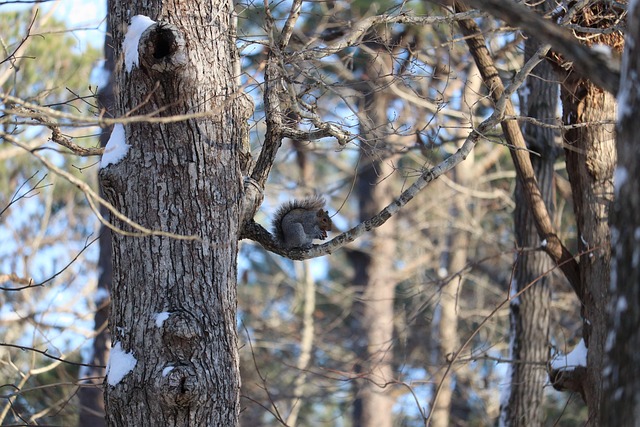Understanding squirrel behavior is crucial for effective residential squirrel treatment. This involves a combination of physical barriers like buried fences and mesh fencing, natural deterrents like thorny plants, and strategic landscaping. Eco-friendly methods include planting herbs with strong scents and using predator decoys. For persistent infestations, professional wildlife control offers advanced humane solutions to prevent reoccurrence, ensuring peaceful coexistence while protecting gardens.
Squirrels can turn your lush garden into a nut-filled feast, but with the right landscaping modifications, you can reclaim your outdoor space. This comprehensive guide explores effective strategies to deter squirrels from gardens, focusing on understanding their behavior as the key to success. We delve into physical barriers, natural repelents, and professional help for persistent residential squirrel treatment. Learn how to create a squirrel-resistant garden environment that’s both inviting and free from unwanted visitors.
Understanding Squirrel Behavior: Key to Effective Deterrents
Understanding Squirrel Behavior: Key to Effective Deterrents
Squirrels are integral parts of many ecosystems, but when they invade residential gardens, they can cause significant damage to plants and vegetation. To effectively deter squirrels, it’s crucial to understand their behavior patterns. Residential squirrel treatment should not only focus on repellents but also consider environmental factors that attract or repel these creatures. Squirrels, for instance, are highly adaptable and intelligent, quickly learning to avoid perceived threats. They communicate extensively using scent markings and visual signals, which can be leveraged in landscaping strategies.
Creating a less inviting environment for squirrels involves combining physical barriers with scent-based deterrents. Plants with strong scents or textures that squirrels dislike can be strategically placed around the garden. Natural repellents like garlic, chili peppers, or specific herbs can also help keep squirrels at bay. Moreover, ensuring proper landscaping maintenance, such as trimming trees and shrubs to reduce shelter options, can significantly deter squirrels from residential areas.
Physical Barriers: Creating a Squirrel-Resistant Garden Environment
Creating a squirrel-resistant garden environment involves implementing physical barriers that deter these furry visitors from feasting on your fruits and vegetables. One effective method is installing sturdy fences around the perimeter of your garden, ensuring they are buried slightly underground to prevent squirrels from digging underneath. Mesh or wire fences with small enough openings are ideal, as they restrict access while allowing water and sunlight to penetrate.
Additionally, using raised beds or containers with capped sides can create physical barriers that keep squirrels at bay. Planting shrubs or trees with thorny branches near the garden edge can also act as a natural deterrent, as squirrels prefer to avoid areas where they might get pricked. These physical measures, combined with strategic landscaping, can significantly reduce residential squirrel treatment needs and ensure your garden thrives without unwelcome visitors.
Natural Repellents: Safe and Eco-Friendly Solutions
Squirrels can be a nuisance in gardens, but there are natural and eco-friendly ways to deter them without resorting to harmful chemicals. Planting certain herbs and flowers known for their strong scent can act as a squirrel repellent. For example, plants like lavender, rosemary, and marigolds have been shown to discourage squirrels from entering residential areas. These scents are unpleasant to squirrels and can effectively keep them at bay.
Another safe method is using natural predators’ urine or decoys. This might sound unconventional, but predators such as foxes or coyotes use their scent to communicate danger, which can deter squirrels. You can find these products online specifically designed for residential squirrel treatment, offering a humane and environmentally friendly solution to keeping your garden free from unwanted visitors.
Professional Help: When DIY Methods Fall Short in Residential Squirrel Treatment
In many cases, homeowners might attempt to address squirrel infestations in their gardens using DIY methods such as setting traps or applying repellents. However, when these approaches prove ineffective or cause concern due to animal welfare issues, it’s time to consider professional help for residential squirrel treatment.
Professional wildlife control experts are equipped with advanced techniques and knowledge of local regulations, ensuring humane and effective solutions. They can implement tailored strategies that go beyond basic deterrents, addressing the squirrels’ behavior patterns and habitat preferences to prevent reoccurrence. This specialized residential squirrel treatment is especially valuable in areas where squirrels have become accustomed to human presence or when the situation requires a more intricate approach to maintain a peaceful coexistence with these creatures while protecting one’s garden.
In conclusion, addressing squirrel intrusion in gardens requires a multi-faceted approach. Understanding their behavior is key to implementing effective deterrents, whether it’s through physical barriers, natural repellents, or professional help for severe cases of residential squirrel treatment. By combining these strategies, homeowners can create a squirrel-resistant environment while maintaining an eco-friendly and aesthetically pleasing outdoor space.
